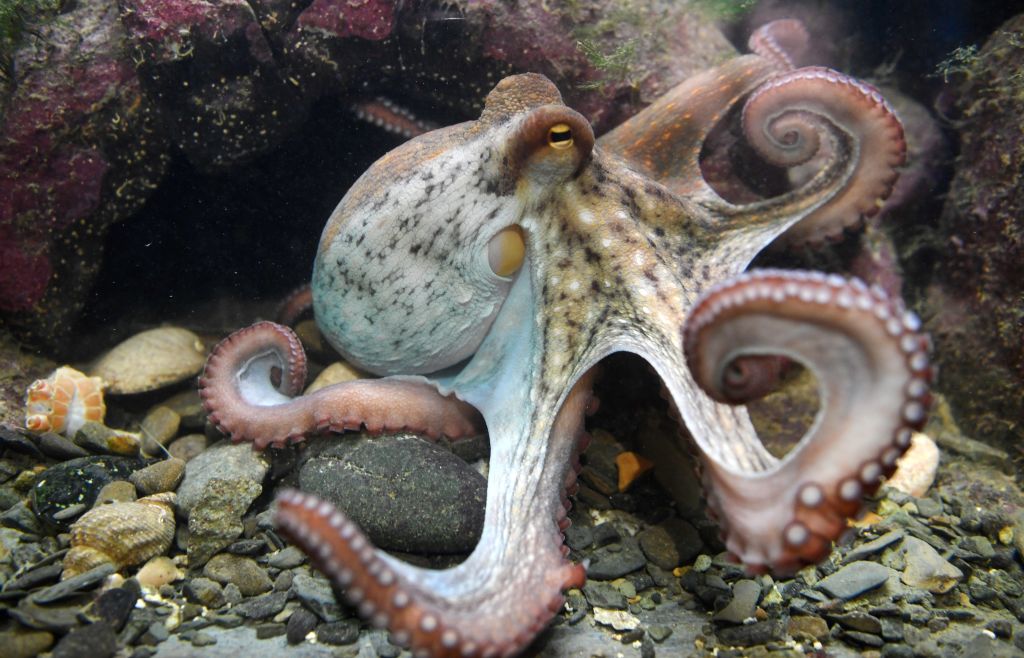Are octopuses aliens? These 33 scientists think they just might be ...


Octopuses are pretty weird. So weird, in fact, that we know very little about their strange and solitary existences, with Quartz suggesting that "they are the closest creature to an alien here on Earth." Now, 33 scientists from respectable institutions like the University of Alberta's Department of Biochemistry and the Center for the Physics of Living Organisms at Michigan Technological University have taken it a step further — and suggested that octopuses might have actually arrived on Earth millions of years ago from outer space, The Daily Grail reports.
The researchers' claim is made in the journal Progress in Biophysics and Molecular Biology, and it suggests that a "plausible explanation" for the octopus' genetic weirdness is that "squid and/or octopus eggs arrived in icy bodies several hundred million years ago."
This is quite the leap from the slightly-less-fringe theory of panspermia, which is "the idea that life has spread throughout the universe via comets, asteroids, etc.," as The Daily Grail explains — although panspermia is typically thought of as a possible method for the delivery of microbes or viruses to our planet. The researchers are actually suggesting that "cryopreserved" octopus eggs crashed into Earth several million years ago as a legitimate explanation for the creatures' extraordinary evolution.
The Week
Escape your echo chamber. Get the facts behind the news, plus analysis from multiple perspectives.

Sign up for The Week's Free Newsletters
From our morning news briefing to a weekly Good News Newsletter, get the best of The Week delivered directly to your inbox.
From our morning news briefing to a weekly Good News Newsletter, get the best of The Week delivered directly to your inbox.
There are plenty of skeptics, including biologist P.Z. Myers, who calls the research "garbage" and notes that while there "are novelties in cephalopod evolution," that doesn't just mean you can use it "as evidence [of] an outer space origin for the octopus." He argues that if octopuses really came from another world, "they would be completely unrelated to any other animal lineage on the planet. They would not be related to other mollusks … They would be totally alien." Read more about the debate over whether octopuses are aliens at The Daily Grail.
A free daily email with the biggest news stories of the day – and the best features from TheWeek.com
Jeva Lange was the executive editor at TheWeek.com. She formerly served as The Week's deputy editor and culture critic. She is also a contributor to Screen Slate, and her writing has appeared in The New York Daily News, The Awl, Vice, and Gothamist, among other publications. Jeva lives in New York City. Follow her on Twitter.
-
 Grok in the crosshairs as EU launches deepfake porn probe
Grok in the crosshairs as EU launches deepfake porn probeIN THE SPOTLIGHT The European Union has officially begun investigating Elon Musk’s proprietary AI, as regulators zero in on Grok’s porn problem and its impact continent-wide
-
 ‘But being a “hot” country does not make you a good country’
‘But being a “hot” country does not make you a good country’Instant Opinion Opinion, comment and editorials of the day
-
 Why have homicide rates reportedly plummeted in the last year?
Why have homicide rates reportedly plummeted in the last year?Today’s Big Question There could be more to the story than politics
-
 Blue Origin launches Mars probes in NASA debut
Blue Origin launches Mars probes in NASA debutSpeed Read The New Glenn rocket is carrying small twin spacecraft toward Mars as part of NASA’s Escapade mission
-
 Dinosaurs were thriving before asteroid, study finds
Dinosaurs were thriving before asteroid, study findsSpeed Read The dinosaurs would not have gone extinct if not for the asteroid
-
 SpaceX breaks Starship losing streak in 10th test
SpaceX breaks Starship losing streak in 10th testspeed read The Starship rocket's test flight was largely successful, deploying eight dummy satellites during its hour in space
-
 Rabbits with 'horns' sighted across Colorado
Rabbits with 'horns' sighted across Coloradospeed read These creatures are infected with the 'mostly harmless' Shope papilloma virus
-
 Lithium shows promise in Alzheimer's study
Lithium shows promise in Alzheimer's studySpeed Read Potential new treatments could use small amounts of the common metal
-
 Scientists discover cause of massive sea star die-off
Scientists discover cause of massive sea star die-offSpeed Read A bacteria related to cholera has been found responsible for the deaths of more than 5 billion sea stars
-
 'Thriving' ecosystem found 30,000 feet undersea
'Thriving' ecosystem found 30,000 feet underseaSpeed Read Researchers discovered communities of creatures living in frigid, pitch-black waters under high pressure
-
 New York plans first nuclear plant in 36 years
New York plans first nuclear plant in 36 yearsSpeed Read The plant, to be constructed somewhere in upstate New York, will produce enough energy to power a million homes
